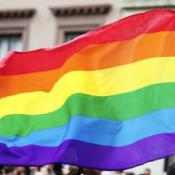 In the United States, twelve states currently have religious refusal laws. These laws allow businesses to refuse service to sexual minorities, such as lesbian or gay couples. According to new research in JAMA Psychiatry, religious refusal laws harm the mental health of sexual minorities.
In the United States, twelve states currently have religious refusal laws. These laws allow businesses to refuse service to sexual minorities, such as lesbian or gay couples. According to new research in JAMA Psychiatry, religious refusal laws harm the mental health of sexual minorities.
The Legal Context of Religious Refusal Laws
In 2015, the U.S. Supreme Court ruling in Obergefell v. Hodges became a landmark case for LGBTQ+ rights. The Supreme Court ruled that the Equal Protection and Due Process clauses of the U.S. Constitution protect equal marriage rights among same-sex couples. The ruling legalized same-sex marriage across the U.S.
Yet opponents of marriage equality have found new ways to fight the practice. One strategy is through religious refusal laws. These laws allow businesses to refuse service as an alleged form of religious freedom and free speech.
A Colorado religious refusal case has recently garnered national attention. In December of 2017, the U.S. Supreme Court heard oral arguments in Masterpiece Cakeshop v. Colorado Civil Rights Commission. The case arose when a cake shop owner sued the state of Colorado. The owner argued he should be allowed to deny service to a same-sex couple based on his religious beliefs.
The Colorado Court of Appeals ruled against the cake shop owner. The Supreme Court of Colorado refused to hear an appeal. The U.S. Supreme Court is scheduled to release its opinion on the case today, June 4.
A Study of Religious Refusal Laws
The study used 2014-2016 Behavioral Risk Surveillance System data from nine states. Three of the nine states in the study have religious refusal laws:
- Michigan’s law permits adoption and child welfare agencies to deny adoption to same-sex couples.
- Utah’s law allows government officials to refuse to issue same-sex marriage licenses.
- North Carolina’s laws allow magistrates to refuse to perform same-sex marriages. They also prohibit counties and cities from passing anti-discrimination laws based on gender identity or sexual orientation.
Six nearby states (Nevada, Idaho, Ohio, Indiana, Virginia, and Delaware) functioned as controls. The states did not have religious refusal laws. Yet they did have similar demographics to the main three states.
The study included 109,089 adults ages 18 to 64. There were 4,656 participants (4.8%) who identified as gay, lesbian, bisexual, or unsure of their sexual orientation.
The study recorded participants’ mental distress at multiple times. Researchers asked participants how often they’d had poor mental health in the past 30 days. People who had 14 or more days of “poor mental health” were said to have mental distress.
The Impact of Religious Refusal Laws on Mental Health
In 2014, 21.9% of gay, lesbian, bisexual, or “unsure” adults reported mental distress. This was nearly twice the rate of straight adults (12.6%). These statistics were measured before the Obergefell decision. They predate the state religious refusal laws.
By 2016, mental distress rates rose at different rates between populations.
- In the three states with religious refusal laws, the mental distress rates rose 10.1% among sexual minorities. Straight adults in these states had only a 0.8% increase in mental distress.
- In the six control states, the rate rose by 1.3% for sexual minorities. Straight adults saw a 1% increase in mental distress.
The study did not directly ask about the effects of religious refusal laws. Thus, the exact relationship between these laws and mental distress is unclear. Yet there was a significant increase in mental distress only 7-18 months after the laws passed.
The researchers believe this increase is a sign of the laws’ widespread effects. They say state laws that permit religious refusal may affect the treatment of sexual minorities within those states. Prejudice and inequality impact all sexual minorities, not just the ones who are directly denied services.
Therapy can help sexual minorities manage the stress of discrimination and stigma. A therapist may also help LGBTQ+ people maintain healthy relationships, even when they encounter minority stress.
References:
- Masterpiece Cakeshop, Ltd. v. Colorado Civil Rights Commission. (n.d.). SCOTUS Blog. Retrieved from http://www.scotusblog.com/case-files/cases/masterpiece-cakeshop-ltd-v-colorado-civil-rights-commn
- Obergefell v. Hodges. (n.d.). SCOTUS Blog. Retrieved from http://www.scotusblog.com/case-files/cases/obergefell-v-hodges
- Raifman, J., Moscoe, E., Austin, S. B., Hatzenbuehler, M. L., & Galea, S. (2018, May 23). Association of state laws permitting denial of services to same-sex couples with mental distress in sexual minority adults: A difference-in-difference-in-differences analysis. JAMA Psychiatry. Retrieved from https://jamanetwork.com/journals/jamapsychiatry/fullarticle/2680808?resultClick=1
- Religious refusal laws harm sexual minority mental health. (2018, May 23). Retrieved from https://medicalxpress.com/news/2018-05-religious-laws-sexual-minority-mental.html
© Copyright 2018 GoodTherapy.org. All rights reserved.
The preceding article was solely written by the author named above. Any views and opinions expressed are not necessarily shared by GoodTherapy.org. Questions or concerns about the preceding article can be directed to the author or posted as a comment below.

 Embracing Your Identities: What It Means to Come Out
Embracing Your Identities: What It Means to Come Out Keeping Faith: Gender Identity, Sexual Orientation, and Spirituality
Keeping Faith: Gender Identity, Sexual Orientation, and Spirituality An Exploration of Pride: Why Do We Celebrate Pride Month?
An Exploration of Pride: Why Do We Celebrate Pride Month?